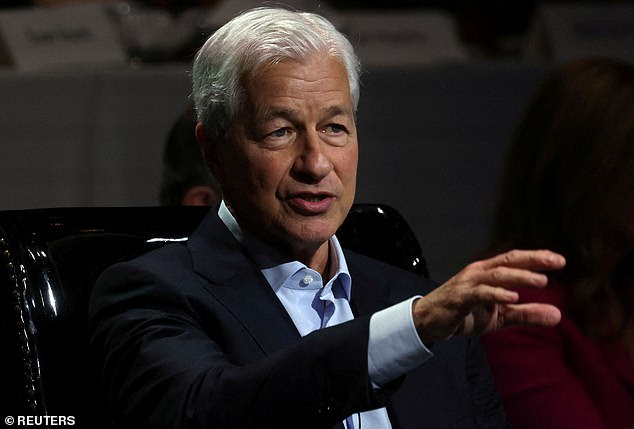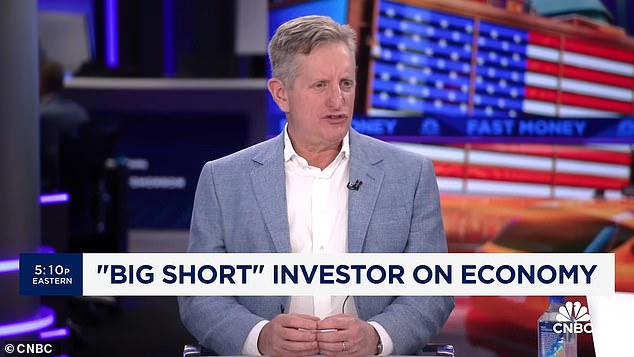Over the past few weeks, financial luminaries have issued stark warnings about the state of the US economy.
Famed ‘Big Short’ investor Steve Eisman told the Daily Mail last week that a prolonged trade war between the US and China would trigger a full-blown recession.
‘I don’t see a recession unless there is a trade war with China,’ he said. ‘If there is a trade war with China, all bets are off.’
Financial journalist and author Andrew Ross Sorkin drew parallels between today’s surging Wall Street values and the Crash of 1929.
‘I just can’t tell you when, and I can’t tell you how deep,’ he told CBS News’ 60 Minutes this week. ‘But I can assure you, unfortunately, I wish I wasn’t saying this, we will have a crash.’
Finally, JPMorgan boss Jamie Dimon predicted in a recent Bloomberg interview that a recession could occur as early as 2026.
He’s also recently sounded the alarm on poor job numbers. In August, employers added only 22,000 jobs, much less than Wall Street’s anticipated 75,000 positions.
Then on Tuesday, Dimon weighed in on the collapse of a subprime auto lender and the bankruptcy of an auto parts-supplier.

Finally, JPMorgan boss Jamie Dimon predicted that a recession could occur as early as 2026

Famed ‘Big Short’ investor Steve Eisman told the Daily Mail last week that a prolonged trade war between the US and China would trigger a full-blown recession
‘My antenna goes up when things like that happen,’ Dimon told analysts during a call. ‘I probably shouldn’t say this, but when you see one cockroach, there are probably more… Everyone should be forewarned on this.’
He certainly paints a harrowing portrait of the American economy. And it’s good to have the leaders of banks injecting a warning tone into the markets.
But for the average investor, there’s one thing to know about those predicting recession, they don’t know poo-poo.
Dimon is a fantastic CEO. He’s one of the most successful in history in terms of executional skills. As a forecaster of markets, Dimon and the other prognosticators remind me of a broken clock: they’re right twice a day.
Dimon has been calling for a recession for three years now. If the typical worker took that to heart – and pulled his cash out of the stocks and stuck it in the mattress, then he would have missed out on extraordinary returns.
Additionally, even when there is a crash, sometimes the market goes flat for months, and then in a matter of days 80 percent of the returns are captured in four trading sessions.

I, too, hear this noise and read the reports, but I don’t use them when making investment decisions
If you’re not in the market in those sessions, you’ve missed out.
That’s the problem of trying to time the market. It doesn’t work.
I, too, hear this noise and read the reports, but I don’t use them when making investment decisions.
Look, I see why some investors might be spooked – stocks tumbled on Friday when President Donald Trump threatened an additional 100 percent tariffs on China after the Chinese imposed export controls on rare earth minerals.
But come Monday, stocks rebounded.
By Wednesday, it was back in the green.
The market believes there will be a resolution to the prolonged negotiations – which I predict will be reciprocal tariffs of 10 to 15 percent – even though the deal may take years to resolve.
Think back to April 2, so called ‘Liberation Day,’ when Trump announced that broad sheet of global tariffs. The deepest darkest fears of Trump’s gambit – even though policy continues to be volatile – have not come to pass.
The impact of tariffs on earnings hasn’t really been felt yet. If they are inflationary, it has yet to be seen. The economy and the consumer look pretty good right now and markets continue to focus on the future.
Finally, the US economy is nowhere near a technical recession, defined broadly as two consecutive quarters of negative economic growth. In fact, the economy grew three percent during the second quarter of 2025, higher than analysts predicted.
Being in the market means you’re willing to take a risk: you’re exposed to both the ups and downs. In my opinion, the benefits of being in the game far outweigh the potential costs and the best option, then, is to stay the course.
There’s always going to be something to worry about. But if you’re always waiting for the recession to come – you’ll lose.
